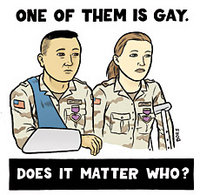
Late last week, the Pentagon sent a 44-question survey to roughly 150,000 military spouses as part of the ongoing review of “Don’t Ask, Don’t Tell,” (DADT) and what impact repeal will have on such factors as military readiness and retention.
The obvious flaw in this survey is that it presumably won’t be going to any spouses or partners of gay and lesbian servicemembers. Hearing their perspectives on how DADT impacts them and their loved ones would be an invaluable addition to this discussion.
Thankfully, Service Members Legal Defense Network (SLDN) on Monday began releasing what will be a weeklong series of letters from the family members and spouses of former servicemembers impacted by DADT. The series opens with a moving letter from Lynne Kennedy, partner to retired Navy Capt. Joan Darrah.
Lynne writes about the difficulties DADT imposes on the loved ones of gay, lesbian and bisexual service members:
There were so many things that we had to be careful about. For example, Joan had asked that I not call her at work unless it was truly an emergency. When we were out in public if Joan saw someone from work, I learned to “disappear,” until Joan’s co-worker moved on. We didn’t dare go to nice restaurants on Valentine’s Day or even Saturday nights. We could not show any familiarity while out in public. I went to parties at colleagues’ homes alone lest a guest I didn’t know learn that Joan was in the Navy.
As if military spouses did not have to endure enough stress as is, those who are in same-sex relationships are essentially forced to deny who they really are in order for their loved one to be able to serve in the armed forces. No one should ever have to make such a ridiculous compromise in the furtherance of senseless discrimination.
On the morning of September 11, 2001, Joan had just left a meeting in the Pentagon, which would be the exact location seven minutes later where a plane would crash into the building, completely destroying the room and killing seven of her colleagues.
Lynne describes her feelings in those days immediately following:
As the numbness began to wear off, it hit me how incredibly alone I would have been had Joan been killed. The military is known for how it pulls together and helps people; we talk of the “military family,” which is a way of saying we always look after each other, especially in times of need. But, none of that support would have been available for me, because under DADT, I didn’t exist.
Lynne goes on to rightly wonder about all those men and women whose spouses and partners have been seriously wounded or killed in Iraq or Afghanistan who are forced to suffer and grieve in isolation. Those who willingly put their lives at risk in our military, as well as those they happen to love, deserve better from their country. Please stand with the ACLU in urging Congress to finish the job of repealing DADT this year.



